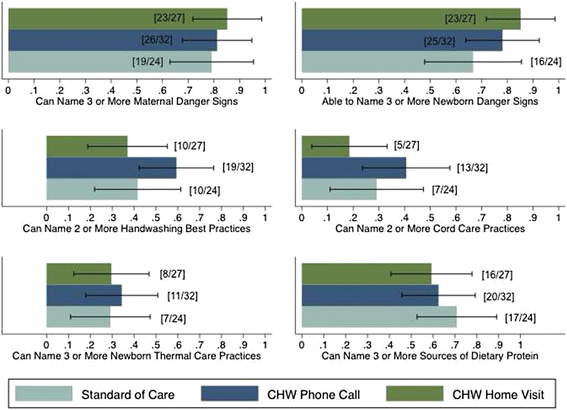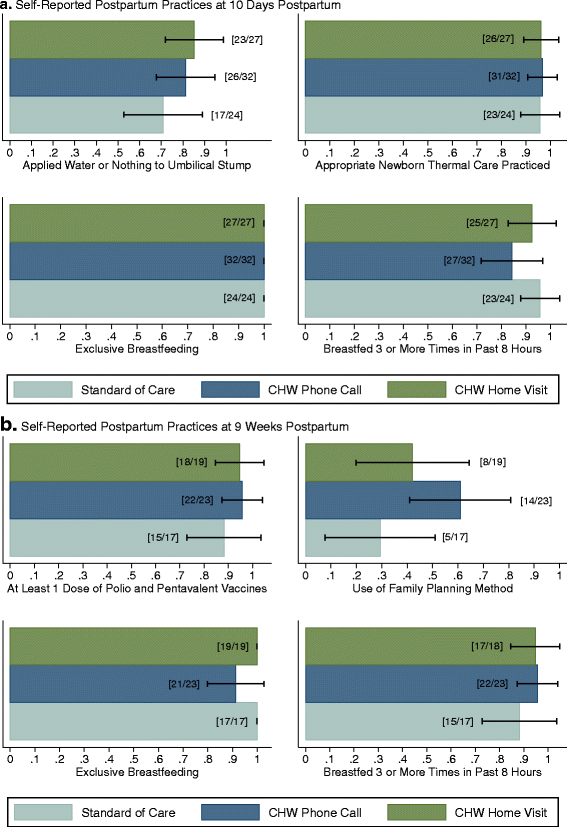Can a community health worker administered postnatal checklist increase health-seeking behaviors and knowledge?: evidence from a randomized trial with a private maternity facility in Kiambu County, Kenya
- PMID: 27260500
- PMCID: PMC4893209
- DOI: 10.1186/s12884-016-0914-z
Can a community health worker administered postnatal checklist increase health-seeking behaviors and knowledge?: evidence from a randomized trial with a private maternity facility in Kiambu County, Kenya
Abstract
Background: Since the 2009 WHO and UNICEF recommendation that women receive home-based postnatal care within the first three days after birth, a growing number of low-income countries have explored integrating postnatal home visit interventions into their maternal and newborn health strategies. This randomized trial evaluates a pilot program in which community health workers (CHWs) visit or call new mothers three days after delivery in peri-urban Kiambu County, Kenya.
Methods: Participants were individually randomized to one of three groups: 1) early postnatal care three days after delivery provided in-person with a CHW using a simple checklist, 2) care provided by phone with a CHW using the same checklist, or 3) a standard of care group. Surveys were conducted ten days and nine weeks postnatal to measure outcomes related to compliance with referrals, self-reported health problems for mother and baby, care-seeking behaviors, and postnatal knowledge and practices around the recognition of danger signs, feeding, nutrition, infant care and family planning.
Results: The home visit administration of the checklist increased the likelihood that women recognized postnatal problems for themselves and their babies and increased the likelihood that they sought care to address those problems identified for the child. In both the home visit and mobile phone implementation of the checklist, actions taken for postnatal problems happened earlier, particularly for infants. Knowledge was found to be high across all groups, with limited evidence that the checklist impacted knowledge and postnatal practices around the recognition of danger signs, feeding, nutrition, infant care and family planning.
Conclusion: We find evidence that CHW-administered postnatal checklists can lead to better recognition of postnatal problems and more timely care-seeking. Furthermore, our results suggest that CHWs can affordably deliver many of the benefits of postnatal checklists.
Trial registration: ClinicalTrials.gov NCT02104635 ; registered April 2, 2014.
Keywords: Checklists; Community health workers; Mobile Health; Postnatal care.
Figures
References
-
- World Health Organization. WHO Recommendations on Postnatal Care of the Mother and Newborn. World Health Organization. 2014. http://apps.who.int/iris/bitstream/10665/97603/1/9789241506649_eng.pdf. Accessed 13 Jan 2015.
-
- Kenya National Bureau of Statistics (KNBS) and ICF Macro. (2010) Kenya Demographic and Health Survey 2008–09. KNBS and ICF Macro. 2010. http://dhsprogram.com/pubs/pdf/fr229/fr229.pdf. Accessed 9 Jan 2015
-
- Kenya National Bureau of Statistics (KNBS) and ICF Macro . Kenya Demographic and Health Survey: Key Indicators 2014. Rockville, MD: KNBS and ICF Macro; 2015.
Publication types
MeSH terms
Associated data
LinkOut - more resources
Full Text Sources
Other Literature Sources
Medical
Miscellaneous




